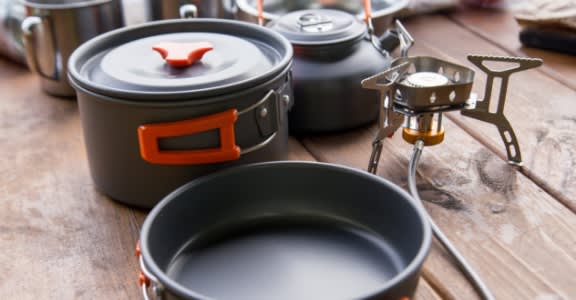
Your camping dishes, a strategic choice
Cooking in the kitchen requires being well equipped. To eat without overloading yourself, you have to choose a camping dish that is perfectly suited to your excursion. We give you all the little tips and advice you need to travel light.
A camping cooker for each practice!
We regroup under the name of camping cookers or bivouac dishes, all the containers needed to prepare meals when you go hiking or camping. Different sizes and shapes are available, but we must distinguish the components of a camping cookers that will be used to really prepare meals from the provisions that you will have taken with you, and the necessary to heat water which will allow you to offer yourself a few breaks around a tea or a coffee or to rehydrate the freeze-dried preparations that you will have stored in your package.
Questions to ask yourself before choosing your bivouac cooker
Whether you need multiple utensils or more basic equipment, there are a few key questions to ask yourself before equipping yourself:
- How often will I use my camping cooker? This will allow you to choose the most suitable material for your use.
- How many people will I have to feed? It would be silly to only have enough to cook for 3 people when you are 4!
- Will I be walking a lot with my gear? If you go camping and don't plan to be wandering around with all your utensils all the time, weight won't be a problem. On the other hand, for hikes and especially when they last several days, it is important to travel light and choose a bivouac set featherweight.
- What is the volume available in my hiking backpack? Yes, sometimes the choice of a cooker is quite simply based on the volume you can transport, so it must be very judicious.
What camping cooker should you take for a good trip?

The saucepan: this is the mendatory utensil. Very versatile, it will allow you to heat water for your tea, to rehydrate your dishes or to reheat preparations.
The frying pan: if you can't do without meat or there's a lake on your way to catch fish, this can be a good idea.
Cutlery and plate: normally you already have your Swiss Army knife, but don't forget to bring forks, spoons and plates with you for a little more comfort, especially if there are several of you.
Drinking utensils: glasses, cups, goblets are available in a camping version, it's up to you to make the wisest choice.
Also not to be forgotten in your backpack:
- One litre bottle per person to fill as soon as the opportunity arises
- A new lighter per person and two if you are alone
- Marseille soap for the dishes, but which can also be used for your toilet if you are going away for several days.
Tip: to travel light, be smart!
No way to mess around with cookware if you don't need it! To not overload you, think smart like with the plates which also act as frying pan or the cooker whose lid can also pass on the fire. If you are alone maybe you can just take a spoon and eat straight from your bowl, it will still be the weight and bulk of a plate and a fork less. Finally, the cup can represent the right compromise to enjoy your hot and cold drinks and, at the same time, have less dishes to do!
Which material to choose?
Weight and resistance are important issues when choosing a camping cooker, so different materials are available to you to find the equipment that suits your use:
- Aluminum: it is very light, but can quickly show signs of fatigue if used intensively.
- Steel: it resists scratches and repeated cleaning very well, but is quite heavy.
- Stainless steel: while it is very affordable, it is also heavy.
- Titanium: it's a bit like the Rolls Royce of the camping cookers. It is light & resistant, but it is also more expensive.
What system to use to heat your cooker
When you go hiking or camping, you have three options for preparing hot meals. The first is the stove, a hiking essential. You can also opt for the campfire. In both cases, you will need to check the compatibility of your camping cooker with the different types of flames. Finally, there are also bivouac cookers with integrated stove. If you find one of these models, just make sure the gas system is full when you leave.
You now know everything you need to know and all the little tips and advice on choosing your camping cooker and traveling light, while being well equipped. So, to make your outdoor getaways comfortable, don't forget to weigh the pros and cons before making your choice!
The three key points to remember when choosing your camping cooker:
- If you plan to carry your camping cooker on a hike, choose your utensils carefully to travel light
- The 2 in 1 utensils will allow you to limit the weight of your package
- In order for your camping cooker to last a long time, you will need to opt for a resistant material, especially if you camp often.










